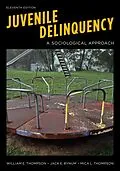Juvenile Delinquency, Eleventh Edition, discusses delinquency as it relates to and emerges from the youth's family, neighborhood, school, peer group, social class, and overall cultural and social environment. Balancing theory with application, the authors explore the different causes of juvenile delinquency, examine its behaviors and consequences in social contexts, explain the role of the police and court system, and propose strategies for treatment and prevention. Interdisciplinary scholarship from sociologists, psychologists, social workers, criminologists, and other specialists who have sought to understand, explain, control, and prevent juvenile delinquency is incorporated throughout the text. Learning outcomes offer students a roadmap for major concepts and key ideas while end-of-chapter outcomes assessments stimulate critical thinking and discussion. In each chapter, "Global Focus on Delinquency" boxes look at delinquency in different societies, cultures, and subcultures and "Controversial Issue" boxes address critical questions. New to This Edition: New Chapter, "Female and LGBTQ Delinquency and Feminist Theories" emphasizes often overlooked female delinquency and juvenile delinquency in the LGBTQ+ communityNew and updated coverage of the media and social media is incorporated throughout the book to highlight one of the most important influences on juvenile delinquency todayNew discussion of transnational gangs and their influence both within and across national borders highlights a global rise in nationalism (Chapter 12)Updated coverage of video gaming and violence, cyberbullying, school shootings, drug usage, drinking, smoking, and vaping is presented and analyzed to keep students up to date on contemporary issues
Autorentext
William E. Thompson is professor of sociology at Texas A&M University-Commerce. Professor Thompson has authored and coauthored more than 40 articles in professional journals, including several reprinted in sociology textbooks and readers.
Klappentext
This sophomore/junior level core text is intended for the juvenile delinquency course taught in criminal justice, criminology, and sociology departments at both four year and two year institutions. Taking a sociological approach, Juvenile Delinquency, Eleventh Edition, discusses delinquency as it relates to and emerges from the youth's family, neighborhood, school, peer group, social class, and overall cultural and social environment. The author incorporates contributions from sociologists, psychologists, social workers, criminologists, and other specialists who have sought to understand, explain, control, and prevent juvenile delinquency.
Updates to the Eleventh Edition:
• New coauthor Mica L. Thompson adds to feminist perspective and analysis
• Completely updated data from FBI Uniform Crime Reports and Juvenile Court
Statistics, as well as new figures, tables, and boxes
• New chapter on female delinquency, LGBTQ youths, and feminist theories of delinquency
• Coverage of contemporary topics such as the influence of social media, the possible connection between video gaming and violence, cyberbullying, school shootings, as well as data on drug usage, drinking, smoking, and vaping
• Streamlined chapter on juvenile corrections and treatment and prevention
Inhalt
1 A Sociological Approach to Juvenile Delinquency
2 Dimensions of Juvenile Delinquency
3 Classical, Biological, and Psychogenic Explanations of Juvenile Delinquency
4 Social Strain and Cultural Transmission Theories
5 Social Learning and Social Control Theories
6 Labeling and Radical/Conflict Theories
7 Integrated Theories: Maturation/Life-Course and Rational Choice/Deterrence
8 Female and LGBTQ Delinquency and Feminist Theories
9 Family and Delinquency
10 Schools and Delinquency
11 Youth Subcultures and Delinquency
12 Juvenile Gangs and Delinquency
13 Juveniles and the Police
14 Juvenile Courts and Corrections
15 Delinquency Treatment and Prevention
16 Rethinking the Delinquency Problem
